No, MYOB and QuickBooks are not the same. QuickBooks generally offers a more modern, cloud-based experience with better integrations and ease of use, while MYOB is a powerful option for businesses in Australia and New Zealand needing robust payroll and inventory management.
What Are MYOB and QuickBooks? Comparison for 2025
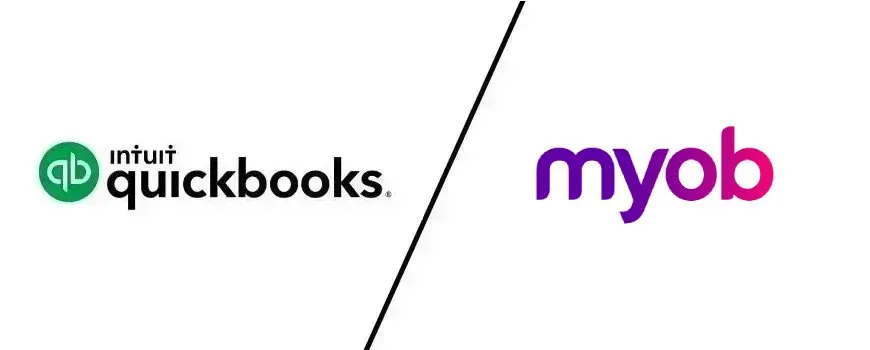
If you’re asking What Is MYOB and QuickBooks and are they the same? — they’re not.
While both are accounting software platforms, they cater to different business needs and offer unique strengths.
Quick Breakdown:
- MYOB: Desktop-first, strong in payroll, inventory, and tax compliance for AU/NZ businesses.
- QuickBooks: Cloud-native, scalable, globally used with intuitive tools and broader integrations.
Who Uses Them:
- MYOB: Ideal for SMEs in Australia and New Zealand with local compliance requirements.
QuickBooks: Best for small businesses and freelancers needing flexibility, automation, and global scalability.
Key Features Compared — MYOB vs QuickBooks
User Experience and Interface
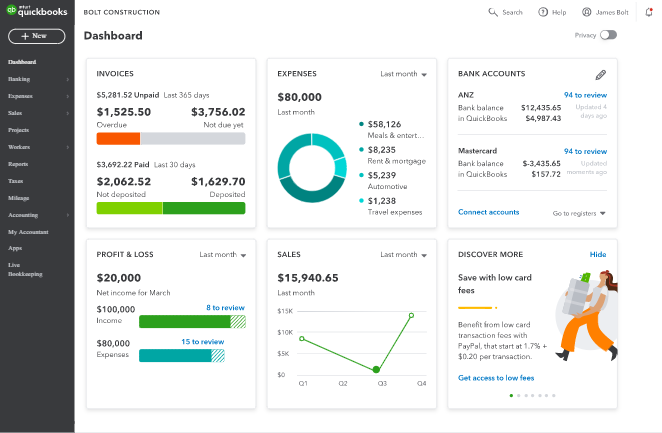
- QuickBooks: User-friendly, minimal learning curve.
- MYOB: More traditional interface; powerful but can feel outdated.
Accounting & Bookkeeping Capabilities

Both platforms offer:
- Double-entry accounting
- General ledger and journal management
- Auto-reconciliation
QuickBooks edges out with:
- Smoother navigation
- Built-in automation and suggestions
MYOB stands strong in:
- Precision and controls for accountants
- Complex accounting scenarios common in AU/NZ
Tax & Compliance (AU/NZ Focus)

- MYOB:
- Native ATO integration
- BAS, GST, PAYG
- STP-compliant payroll
- Native ATO integration
- QuickBooks:
- Customizable tax rates (AU/NZ supported)
- Simple GST configuration
- Regular updates for local compliance
- Customizable tax rates (AU/NZ supported)
Invoicing and Payments
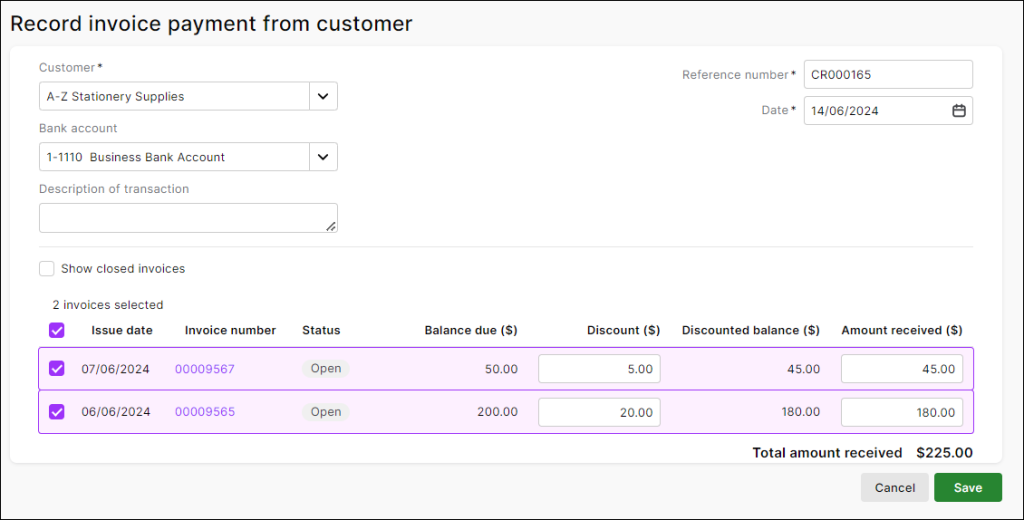
Both platforms allow:
- Custom-branded invoices
- Recurring billing
- Payment tracking
QuickBooks advantages:
- Better integration with Stripe, Square, PayPal
- More polished mobile invoice functionality
MYOB advantages:
- Local bank feeds
- Strong follow-up tools for unpaid invoices
Payroll & HR Management
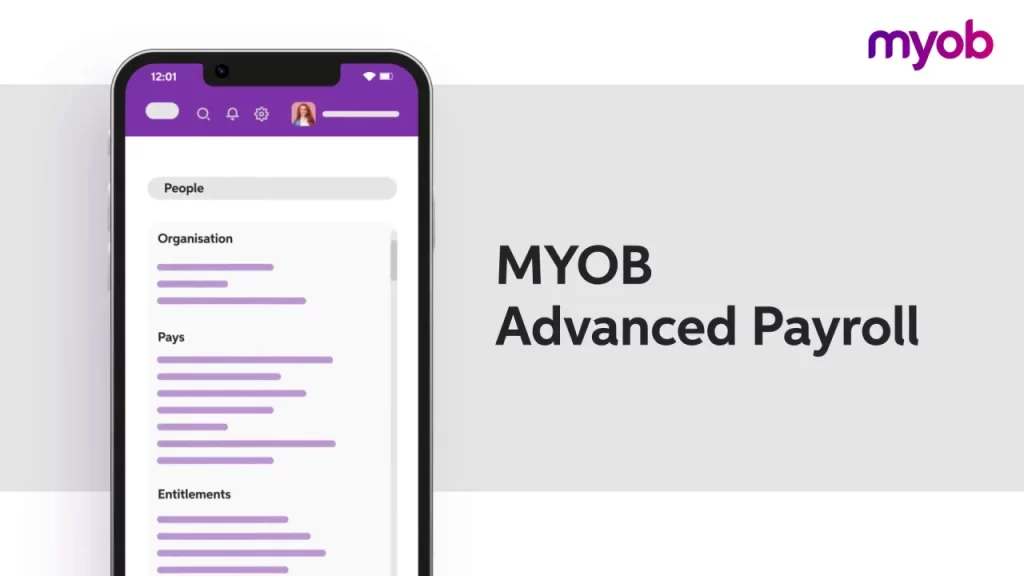
- MYOB:
- Advanced payroll for AU/NZ
- Leave management, superannuation
- Award interpretation and STP compliance
- Advanced payroll for AU/NZ
- QuickBooks:
- Payroll available in AU
- Add-on service, not as robust natively
- Payroll available in AU
Reporting & Business Insights
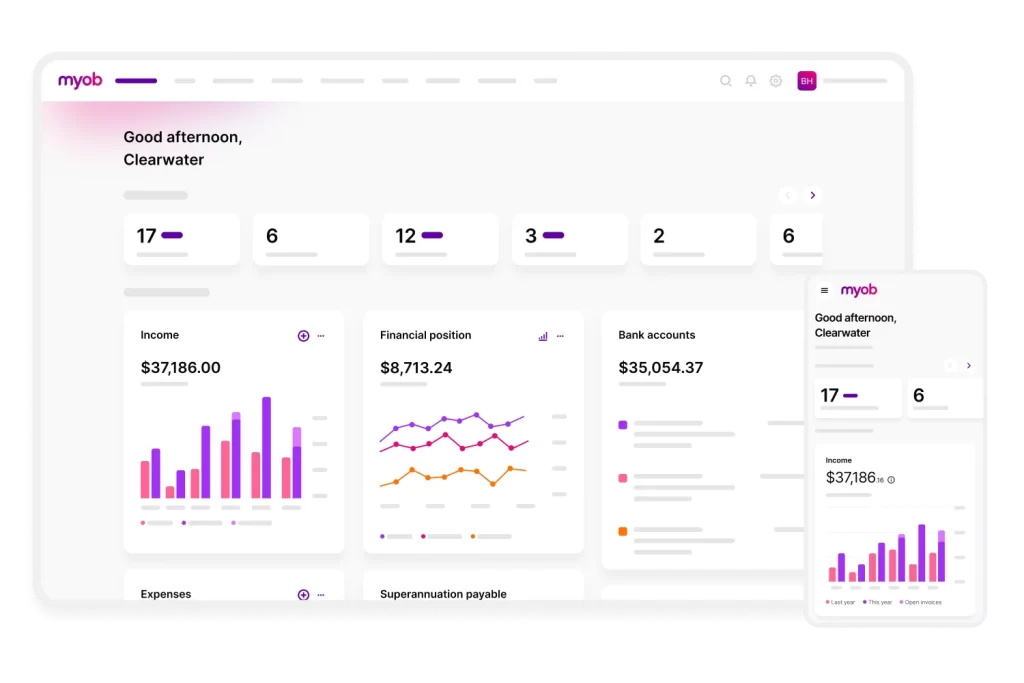
- QuickBooks:
- Interactive dashboards
- Custom KPI and cash flow reports
- Interactive dashboards
- MYOB:
- Stronger reporting around payroll and inventory
- Deeper audit and compliance reports
- Stronger reporting around payroll and inventory
MYOB Pricing vs QuickBooks: Which Offers Better Value?

Note:
- MYOB is often a better value for AU/NZ users needing payroll and compliance tools.
- QuickBooks provides better value for automation, integration, and simplicity.
Can You Switch Between MYOB and QuickBooks?
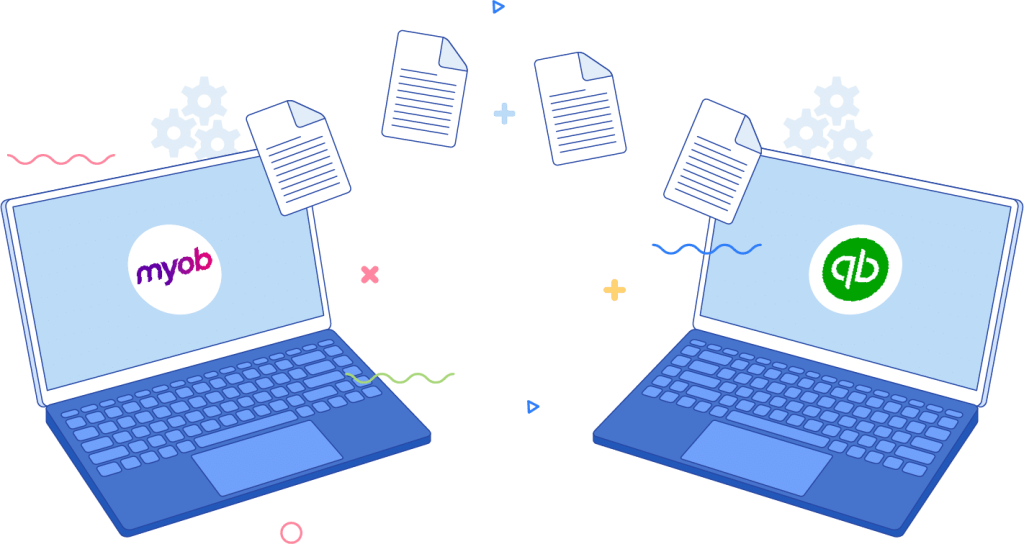
Yes — and it’s easier than most think, provided you prepare.
Switching from MYOB to QuickBooks:
- Export data (CSV or Excel format)
- Clean and structure for QuickBooks
- Import using QuickBooks setup assistant
- Reconnect bank feeds and re-map accounts
Switching from QuickBooks to MYOB:
- Similar process, but MYOB import tools may be less automated
- Manual verification of balances and journals is essential
Note: Payroll, historical taxes, and custom reports may not fully transfer — backups are critical.
Which One Fits Your Business Type?

The choice depends heavily on your business size, location, and operations.
Small Business Owners (Retail, Service-Based)
- QuickBooks:
- Better UX
- Seamless app integrations (e.g., Shopify, HubSpot)
- Great for managing cash flow and simplified bookkeeping
- MYOB:
- More rigid structure, but ideal if you manage employees and inventory in AU/NZ
Freelancers & Independent Contractors
- QuickBooks is a clear winner:
- Easy invoice setup
- Automated expense tracking
- Perfect for BAS/GST without needing payroll
Growing Teams & Medium Enterprises
- MYOB:
- Built-in payroll tools
- Strong multi-user controls
- Local tax and HR compliance baked in
- QuickBooks:
- Suitable for scaling with third-party apps
- Not ideal for large teams needing deep inventory or payroll detail
MYOB vs QuickBooks in AU/NZ and Other Regions
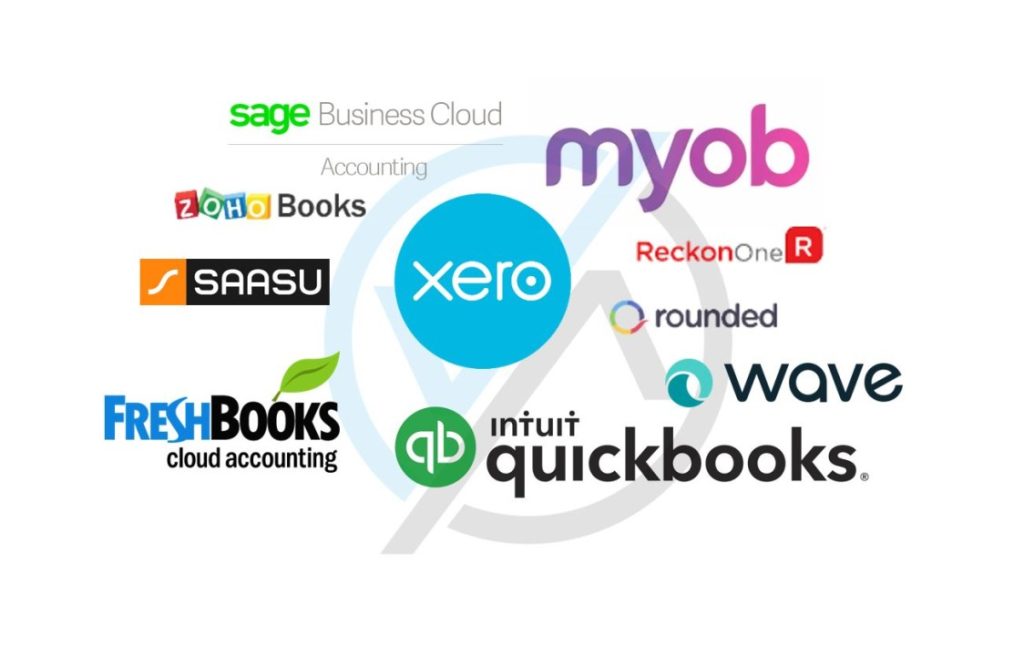
Support and regional fit matter, especially when you’re dealing with tax agencies and compliance requirements.
MYOB:
- Designed for the AU/NZ market
- Direct integration with ATO
- Payroll compliant with local laws
- Strong network of local accountants
QuickBooks:
- Global focus with localized versions
- AU support includes GST and bank feeds
- Partner accountant program available
MYOB vs QuickBooks: Pros and Cons Summary Table
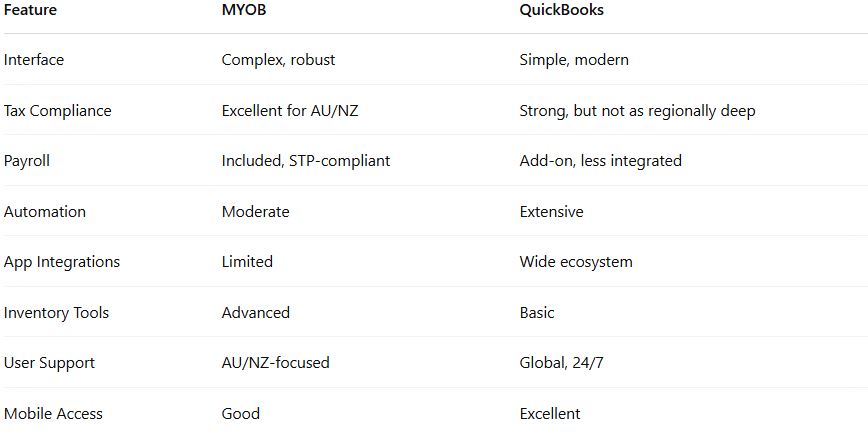
Which Accounting Software Is Better?
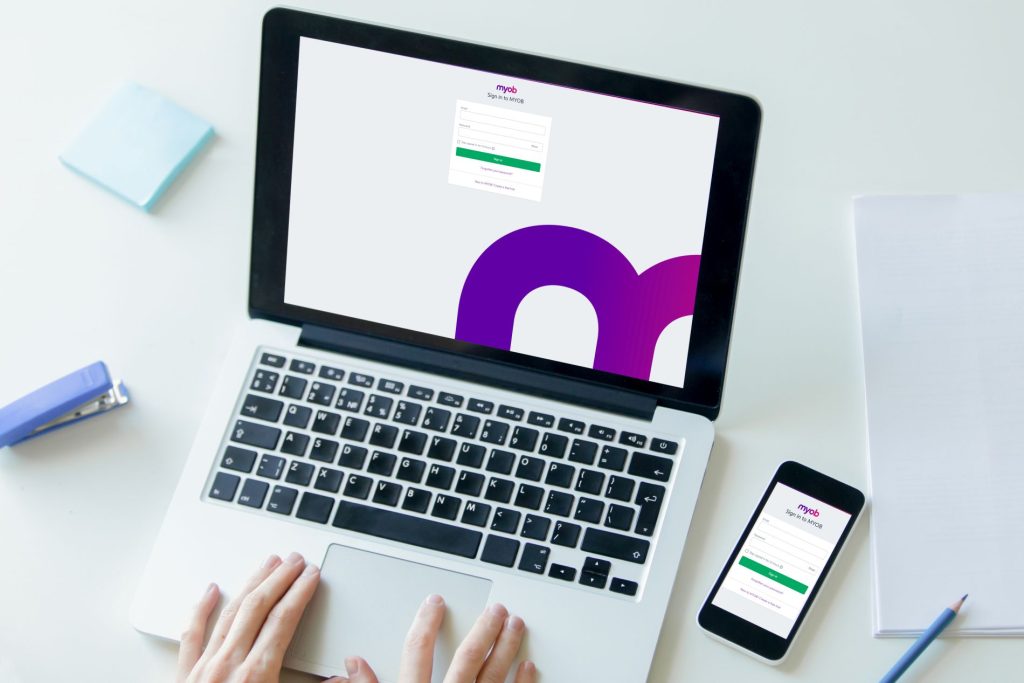
So, which one should you choose?
- Choose MYOB if:
- You run a business in Australia or New Zealand
- Payroll and inventory are key priorities
- You need strong compliance features (BAS, STP, ATO, etc.)
- Choose QuickBooks if:
- You want ease of use and automation
- You’re working in or beyond AU/NZ markets
- Integration with third-party apps and scalability matters
Careers Collectiv recommends QuickBooks for modern startups and freelancers, especially those focused on growth and digital operations.
But for businesses that require robust payroll, inventory management, and local compliance in AU/NZ — MYOB still delivers unmatched depth. If you’re exploring where to learn MYOB to make the most of its features, Careers Collectiv offers training resources to help you get started.
FAQs: MYOB vs QuickBooks Answered
Is MYOB the same as QuickBooks?
No. They are different platforms with distinct features, pricing, and regional strengths.
Is QuickBooks easier to use than MYOB?
Yes. QuickBooks is more beginner-friendly and intuitive.
Which is better for Australia and New Zealand?
MYOB typically offers better localized features for AU/NZ businesses, especially regarding payroll and compliance.
Can I move from MYOB to QuickBooks or vice versa?
Yes, but it requires proper formatting, exporting, and verifying data accuracy during migration.
Do both offer free trials?
Yes, both MYOB and QuickBooks offer 30-day free trials.